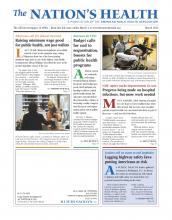A woman’s body will go through many changes during pregnancy, from weight gain to swollen ankles. But pregnant women should be aware of a possible change that can harm both her and her fetus: gestational diabetes.
Gestational diabetes is a condition pregnant women can develop when their blood sugar levels become too high. As pregnant women gain weight, they may develop a resistance to insulin — a hormone that helps control blood sugar, according to the National Institute of Diabetes and Digestive and Kidney Diseases. This resistance may increase the likelihood they’ll develop gestational diabetes.
“Women are usually screened for gestational diabetes between 24 and 28 weeks of pregnancy, but the condition may be screened for earlier if a woman is at higher risk of having it,” says Andrew Bremer, MD, PhD, a program director of the Division of Diabetes, Endocrinology and Metabolic Diseases at the institute.
You may be at a higher risk for having gestational diabetes if you’ve had it before, are overweight or have given birth to a baby that weighed more than nine pounds. Other risk factors include having prediabetes, a family history of Type 2 diabetes or being diagnosed with polycystic ovary syndrome, the institute says.

Photo by Monkeybusinessimages, courtesy of iStockphoto.
Your racial and ethnic background may also play a role. Women who are American Indian, Asian, black, Hispanic or Pacific Islander are at higher risk for gestational diabetes, the institute says.
Constantly feeling thirsty and needing to urinate often while pregnant may be symptoms of gestational diabetes, Bremer says, but sometimes women have no symptoms. A diagnosis of gestational diabetes early in your pregnancy may mean you had Type 2 diabetes before you became pregnant.
“Feeling thirsty and frequent urination are typical clinical symptoms of diabetes; but, unfortunately, those symptoms can be very subtle and women may just chalk them up to being pregnant,” Bremer says.
When it comes to the safety of you and your fetus, the health stakes are very high with gestational diabetes. Pregnant women with gestational diabetes are at risk for developing high blood pressure — which is known as preeclampsia when it occurs during pregnancy. To reduce potential harm to your fetus, you may be asked stay on bed rest and to also avoid excess salt and drink more water, the institute says. Your risk of having to deliver via cesarean section before a full 39 weeks or delivering a larger-than-normal baby may also increase.
If gestational diabetes is unmanaged, there are also risks for your newborn baby, such as respiratory distress syndrome, low blood sugar after birth and other short- and long-term health risks, the institute says.
If you have gestational diabetes, the disease may be managed by a health professional whose goal is to make sure that you are maintaining a safe and healthy blood sugar level, Bremer says. With guidance from a health professional, regularly testing your blood sugar levels every day will become part of your routine.
“Other treatment strategies for those with gestational diabetes are similar to anyone with diabetes — weight maintenance and regular physical activity,” Bremer says. “Properly managing gestational diabetes is important because there’s a lot at stake, both for the mother and the fetus.”
Diligence is key for women who are managing their gestational diabetes. If you have gestational diabetes, talk with your doctor about planning your meals and the amount of exercise you’ll need to get. The institute recommends aerobic activities, such as swimming, and getting at least 30 minutes of exercise a day.
Scheduling regular health care visits is also important so your provider can monitor your gestational diabetes.
Though gestational diabetes goes away for most women after delivery, 5 to 10 percent of U.S. women find they still have high blood sugar levels after giving birth. Having gestational diabetes also greatly increases the risk of future Type 2 diabetes, according to the institute.
Reducing your risk for gestational diabetes
You can reduce your risk for gestational diabetes and minimize harm to both you and your fetus. Getting regular exercise and maintaining a normal weight both before and during pregnancy can help prevent as well as manage the disease.
“Having a healthy body weight and lifestyle prior to conception is definitely optimal,” Bremer says. “If you know you’re overweight at time of conception, working with your health care providers to minimize excessive weight gain during your pregnancy through physical activity and nutrition would be the recommendation.”
For more information on gestational diabetes, visit www.diabetes.niddk.nih.gov
- Copyright The Nation’s Health, American Public Health Association









